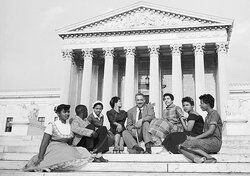Properly speaking, tenancy at sufferance is not a tenancy at all, inasmuch as if the landlord acquiesces in it, it becomes a tenancy at will; and it is to be regarded merely as a legal fiction which prevented the rightful owner from treating the tenant as a trespasser until he had himself made an actual entry on or had brought an action to recover the land.
Prejudice and real or imaginary legal obstacles stood in the way of the erection of episcopal sees in the colonies; and though in the 17th century Archbishop Laud had attempted to obtain a bishop for Virginia, up to the time of the American revolution the churchmen of the colonies had to make the best of the legal fiction that their spiritual needs were looked after by the bishop of London, who occasionally sent commissaries to visit them and ordained candidates for the ministry sent to England for the purpose.
It is probable that this process was largely an unconscious one; and even if conscious, the analogy of the conventional " legal fiction " and the usual anxiety to avoid the appearance of novelty is enough to show that it is not to be condemned.
It is only by a kind of legal fiction akin to the "collegial" theory mentioned above, that the Church can be said to have deemed it expedient to adopt these laws.
Justification is not a legal fiction because one day we will be perfectly righteous.





